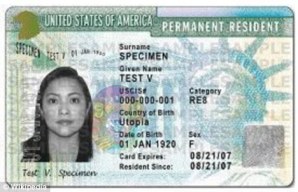by W. John Yahya Vandenberg
So, as you know, President Trump is rapidly issuing Executive Orders. Some of these orders are having major impacts on immigrants and other persons who are not (yet) U.S. citizens.
In light of these developments, we have the following recommendations for persons who are not U.S. citizens:
1. If you are undocumented, then you should be sure that at least two trusted individuals know your name, date of birth, country of origin, “A number” (if you have one), and have the contact information for our office.
2. If you are a U.S. Lawful Permanent Resident (greencard holder), student, visitor, or in other lawful status, carry a copy of your green card, I-94 card, or other proof of legal status with you.
3. If you are here on a student, visitor, exchange, or temporary worker status, CONSULT WITH ME before traveling out of the U.S. I am NOT telling you to violate or overstay your status. I’m saying that your legal status today may not be the same as it was on January 25, 2017. There have, as I’m sure you know, been some changes.
4. If you are from Iraq, Iran, Libya, Syria, Yemen, Sudan, or Somalia, it is highly likely you will not be able to return if you leave the U.S. It doesn’t matter if you have a greencard or a refugee travel documents – do not leave the United States. If you need to go, CONSULT WITH ME. Otherwise, no one can say with certainly when — or if — you will be allowed back in.
5. If you have DACA, CONSULT WITH ME before traveling on an Advance Parole. There is a chance that in the next week or so there will be no more Advance Parole for DACA’s. And you could get stuck outside the US without a chance to come back.
6. If you have a pending I-589 asylum application, I-360 application (VAWA/victim of abuse or Widow/Widower petition, or Religious Worker) or I-485 adjustment of status application, carry a copy of the receipt with you AND give a copy to a trusted person. And do NOT leave the United States if you are from one of the seven countries.
7. If you have a valid social security card, driver’s license, and/or work permit, carry that with you and give a copy to a trusted person.
8. If you are not currently in status (meaning that you do not have a valid non-immigrant or immigrant visa) for any reason, and have been in the U.S. for more than two years, GET PROOF TOGETHER NOW PROVING YOUR PRESENCE. Proof could be bank statements, phone bills, rent receipts, your signature on your children’s report cards, or other documents. Carry a copy of these documents with you (or keep them in your car), and give a copy a trusted person. Do NOT carry with you any document that says where you were born. This is because it is possible that the new Trump Executive Order could mean that undocumented persons who have been in the U.S. for less than two years could be subjected to “Expedited Removal” without the right to see an Immigration Judge and fight your deportation in Immigration Court. If they can’t prove where you were born, then we may be able to get the deportation thrown out of court.
9. If you are afraid of being persecuted in your home country and have not yet filed for asylum, CONSULT WITH ME as soon as possible to analyze your asylum case.
10. If you have children: first, THEY HAVE THE RIGHT TO GO TO SCHOOL. Do not pull your children from school because they don’t have any status in the United States. The Supreme Court states they have the right to their education, no matter their status. And generally, ICE stays away as a policy matter from churches and schools.
Second, your children should always have the name and contact information of a trusted person, and the trusted person should have your information. To be clear, I do NOT believe that ICE will go to schools. But if you get picked up by ICE while the kids are at school, they are going to need a safe place to go after school. They may need to call your friend to get there.
11. If you do not have a license, consider carefully whether you really need to drive or not. Right now, Philadelphia seems safe. The counties – Montgomery, Bucks, Delaware… I am not so sure. Trump’s Executive Order appears to give police officers to ask about immigration status. You could be taken in and turned over to ICE.
12. If you are in a car which is stopped, only the driver has to present a license. Any passenger should only give his/her name and not answer any other questions. Ask if you are free to leave; if so, leave calmly.
13. If you are stopped by police on the street, you have to give them your name and where you live. Ask if you are free to leave. If not, consider yourself under arrest.
14. If you are arrested, repeat clearly that you want to remain silent and you want a lawyer. Do not answer ANY questions other than your name and your address. Call me, or someone you trust, and tell them to call me.
15. If someone comes to your door saying “Police, open up” DO NOT OPEN THE DOOR. Ask the officials if they have a WARRANT, to pass it under the door. Take a photo of the warrant and send it to me or other trusted person. If the warrant is not signed by a JUDGE or MAGISTRATE and does not have your name and address on it, you do not have to open the door. Don’t answer any questions.
These are difficult times we are entering. If it makes you feel any better, it’s not the first time a government has scapegoated immigrants. We’re here for you, and will fight for your rights.
 relationships has changed. Also, no one knows exactly what President Trump will do about undocumented immigrants after he is
relationships has changed. Also, no one knows exactly what President Trump will do about undocumented immigrants after he is 

 in the United States – I’m thinking immigrants with work visas, or greencards, or you are petitioning for a relative who is overseas – you should be OK.
in the United States – I’m thinking immigrants with work visas, or greencards, or you are petitioning for a relative who is overseas – you should be OK.

